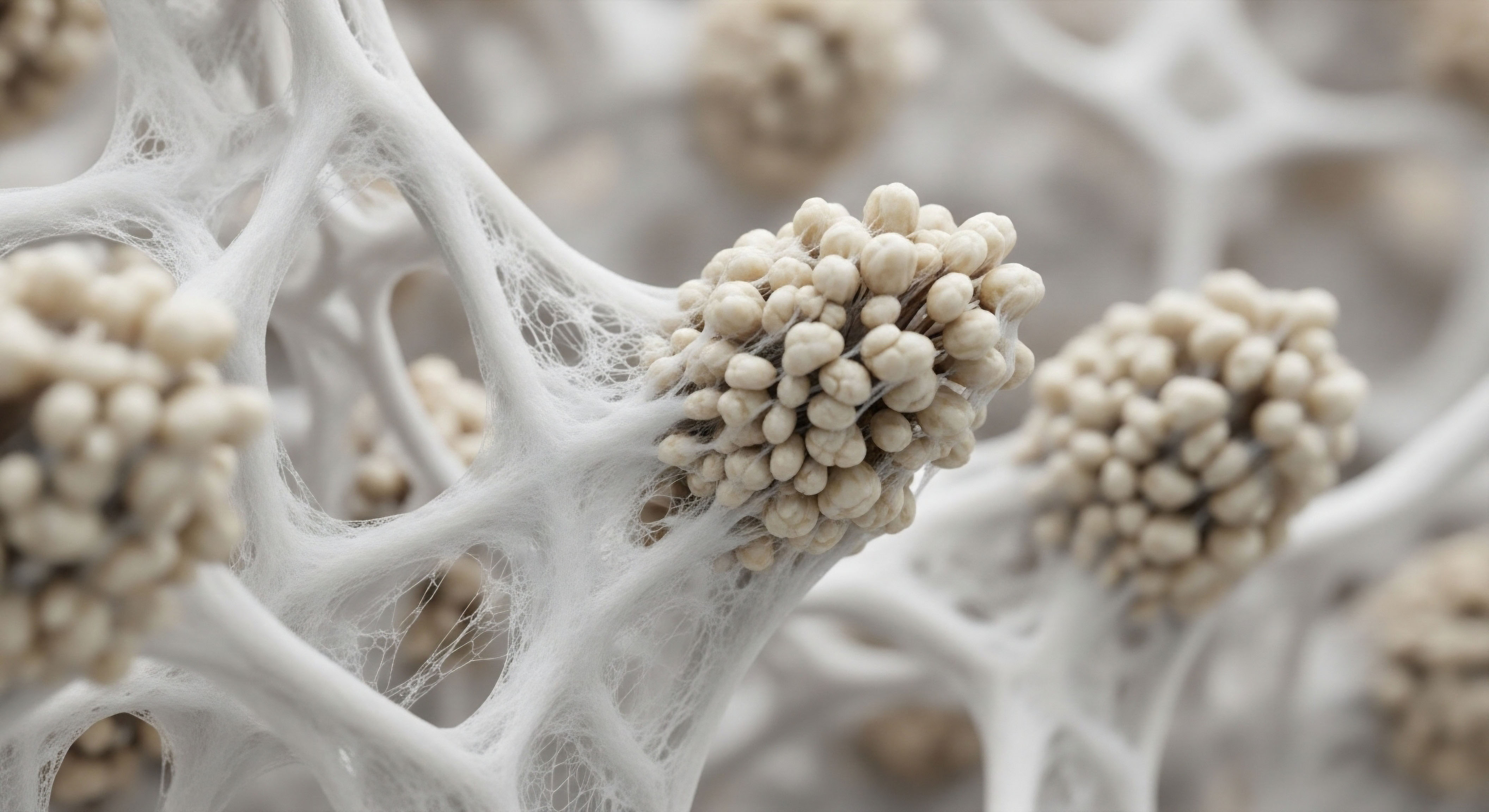

The Mind’s Untapped Horizon
A profound shift often signals itself subtly, a recalibration in the way thought processes unfold. For many, the conventional narrative presents menopausal transition as a period of cognitive decline, an inevitable fading of mental acuity. This perspective, however, misses the deeper truth. The post-menopausal brain stands as a testament to profound adaptability, waiting for intelligent recalibration rather than passive acceptance. Recognizing this crucial distinction allows a complete reframe of the dialogue surrounding mental vitality in midlife and beyond.
Think of the brain as an extraordinarily complex, high-performance engine. Hormonal fluctuations during perimenopause and menopause can alter its finely tuned operating parameters. Estrogen, often viewed simplistically, profoundly influences neuroprotection, neurotransmitter regulation, and cerebral blood flow. When its levels fluctuate and eventually diminish, the brain encounters new metabolic demands, signaling a shift in its internal chemistry.
These signals might manifest as temporary memory lapses, a less immediate recall, or a perception of slower processing. These are not inherent deficits; they represent the system calling for an updated operational protocol.
For those committed to peak performance and sustained cognitive edge, these internal signals serve as data points. They indicate an opportunity to proactively optimize, moving beyond conventional paradigms of “managing” symptoms. A mind once vibrant, quick, and focused should retain those attributes, and indeed, enhance them. The aspiration extends beyond merely regaining prior function; it involves upgrading the neural network for superior resilience and sustained clarity.
The post-menopausal brain initiates a profound adaptability, presenting an opportunity for intelligent recalibration and superior neural network resilience.
This period invites a discerning eye toward biological levers capable of restoring optimal brain chemistry. A proactive stance on cognitive health recognizes that the brain possesses immense neuroplasticity. It continues to form new connections and adapt throughout life.
The objective centers on providing the precise biological instructions to facilitate this ongoing adaptability, ensuring the brain maintains its structural integrity and functional prowess. We are discussing a shift from reacting to proactive optimization, transforming a perceived challenge into a powerful pathway for sustained mental mastery. This intelligent intervention reshapes the cognitive landscape, allowing a continuation of mental sharpness and unwavering focus.


Precision Brain Chemistry Tuning
Recalibrating the post-menopausal brain involves a strategic, evidence-based approach to hormone optimization and peptide therapy. Picture the brain as an intricate digital network, with hormones and peptides serving as the high-fidelity signals and specialized software commands that ensure seamless data flow and optimal processing speed. When key signals diminish, the network experiences latency, a perceptible reduction in performance. Modern protocols aim to restore these critical inputs, re-establishing the brain’s internal communication pathways.

Hormone Recalibration Pathways
Hormone replacement therapy (HRT) for cognitive vitality transcends traditional symptom management. It represents a precise recalibration of the endocrine system, directly influencing brain health. Estrogen, particularly estradiol, plays a multifaceted role within the brain. It supports synaptic density, maintains neuronal integrity, and modulates neurotransmitter systems, including serotonin and acetylcholine.
Replenishing estradiol to physiological levels can stabilize brain energy metabolism, enhance blood flow to cerebral regions, and promote a resilient neurochemical environment. This targeted approach mitigates the cognitive shifts many experience, fostering sustained mental acuity.
Consider testosterone, often associated primarily with male physiology. Women also produce testosterone, and its subtle yet significant decline post-menopause can impact cognitive function, mood, and drive. Testosterone influences spatial memory, verbal fluency, and processing speed. Optimizing these levels can contribute to a sharpened mental edge, enhancing overall cognitive performance. This represents a holistic approach to neuro-endocrine balance, recognizing the synergistic impact of various hormones on brain function.

Peptide-Guided Neural Enhancement
Peptide therapy offers a sophisticated layer of neural optimization. Peptides, chains of amino acids, act as highly specific biological messengers, instructing cells to perform particular functions. They serve as precision tools for cellular communication, bypassing broad systemic effects for targeted outcomes.
- Brain-Derived Neurotrophic Factor (BDNF) Modulation ∞ Peptides like Cerebrolysin or Semax can modulate endogenous BDNF, a protein critical for neurogenesis, neuronal survival, and synaptic plasticity. Elevating BDNF promotes the growth of new neural connections and strengthens existing ones, enhancing learning and memory capabilities.
- Amyloid Beta Clearance ∞ Some peptides, such as certain modified forms of Beta-Amyloid peptides, are being explored for their potential to support the brain’s natural clearance mechanisms for amyloid-beta plaques, which are implicated in age-related cognitive decline. This targeted intervention supports neuronal longevity and cognitive integrity.
- Neurotransmitter Synthesis and Regulation ∞ Peptides can influence the synthesis and balance of key neurotransmitters, including dopamine and acetylcholine. Optimizing these neurochemical pathways improves focus, motivation, and rapid information processing.
- Inflammation and Oxidative Stress Reduction ∞ Certain peptides exhibit potent anti-inflammatory and antioxidant properties, protecting brain cells from damage. Reducing neuroinflammation preserves neural tissue and supports optimal brain function, creating a robust cognitive environment.
These protocols are not a one-size-fits-all solution; they demand individualized assessment. A comprehensive panel of biomarkers, including hormone levels, inflammatory markers, and neurotransmitter precursors, provides the essential data points. This data guides the precise formulation of a personalized protocol, ensuring optimal efficacy and safety. The objective remains a targeted intervention, fine-tuning the body’s intrinsic systems for superior cognitive output.
The application of these advanced strategies fundamentally shifts the perception of menopausal cognitive changes. This is a scientific process of restoration and enhancement, delivering new instructions to the cellular architects of the brain. It positions the individual to reclaim cognitive control, mastering the complex chemistry of their own performance. Each step in the protocol reflects a commitment to biological excellence and sustained mental dominance.


Actualizing Peak Neural Performance
The question of timing often arises when considering advanced biological optimization. For cognitive vitality post-menopause, the optimal moment for intervention often aligns with the earliest signals of change. Beginning a thoughtful, evidence-based protocol when shifts in focus, memory recall, or mental processing speed become noticeable offers the greatest advantage. This proactive stance prevents minor fluctuations from becoming significant performance blockers, ensuring a smoother transition into sustained cognitive excellence.
The timeline for observing benefits varies with individual physiology and protocol specifics, yet tangible improvements often materialize within weeks to a few months. Initial enhancements might appear as improved sleep quality, a more stable mood, or a subtle increase in overall energy. These systemic benefits frequently precede the more pronounced cognitive shifts, reflecting the body’s integrated response to recalibration.

The Cognitive Reawakening Timeline
- Weeks 1-4 ∞ Expect initial subtle shifts. Energy levels might stabilize, and sleep patterns could normalize. Some individuals report a reduction in generalized brain fog, experiencing moments of clearer thought.
- Months 2-3 ∞ Cognitive enhancements become more discernible. Memory recall improves, and mental processing speed picks up. Focus extends for longer periods, and the mind feels sharper, more resilient under pressure. This period reflects the deeper recalibration of hormonal and neurochemical pathways.
- Months 4-6 and Beyond ∞ Sustained gains in cognitive function become the norm. Problem-solving abilities sharpen, and creative thinking flows more freely. This phase marks a new baseline of neural performance, where the brain operates with refined efficiency. Ongoing optimization ensures the maintenance of these elevated states.
This approach is not a temporary fix; it represents a commitment to long-term cognitive resilience. Integrating these advanced protocols empowers individuals to maintain a competitive edge in their professional lives and a vibrant presence in their personal endeavors. It redefines the aging process, moving beyond simple longevity to embrace enduring vitality and mental prowess.
Consider this pathway a strategic investment in your biological capital. The return on this investment manifests as sustained mental clarity, unwavering focus, and an enduring capacity for learning and innovation. It marks a decisive move toward taking command of your cognitive future, ensuring the brain continues to operate at its highest possible level, irrespective of chronological age. The moment to act is when the aspiration for peak mental performance demands a science-backed solution.

The Mind Reimagined
The journey through post-menopausal life offers a powerful opportunity for cognitive renewal. It demands a forward-thinking mindset, one that views biological changes not as limitations, but as signals for intelligent intervention. The path forward involves precise recalibration, employing modern science to refine the body’s intricate systems. This empowers an individual to secure their mental edge, ensuring clarity and vigor persist for decades.
The journey through post-menopausal life presents a powerful opportunity for cognitive renewal, demanding a forward-thinking mindset and intelligent intervention.
We live in an era where the tools for biological optimization are more advanced than ever. These protocols, grounded in rigorous scientific inquiry, empower individuals to move beyond conventional expectations, constructing a future of sustained vitality. The truly powerful question becomes ∞ what will you create with this optimized cognitive capacity?



